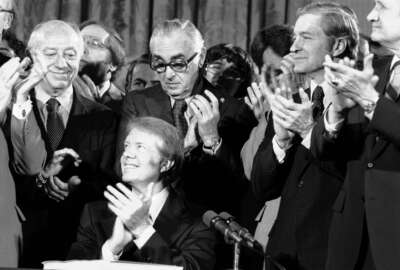Navy explores alternative energy sources
Vice Admiral Philip Cullom is the deputy chief of Naval Operations for Fleet Readiness and Logistics at the Navy.
wfedstaff | June 4, 2015 6:10 pm
The Pentagon is one of the heaviest users of energy in the world. It’s exploring alternative energy sources as a way to eventually lower the prices it pays for power.
In this installment of Agency of the Month, Vice Admiral Philip Cullom, deputy chief of Naval Operations for Fleet Readiness and Logistics, examines what types of energy keep the Navy running currently and how that might change in the future.
He said one of the keys to effective use of alternative fuels is a concept called drop-in.
“What we want to be able to do is to be able to use significant amounts of bio-fuel, but not have to change the engines, and not have to change the way we store it. A drop-in replacement looks, smells, and acts just like petroleum yet actually comes from a different source.”
The latest manifestation of the Navy’s move to alternative fuels is the Green Strike Group.
“We are planning on having [it] go out for RIMPAC 2012, that’s this summer. It’s a[n]…exercise out in the mid-Pacific. A few of the ships that participate in it – an aircraft carrier, the air wing associated with that aircraft carrier, a cruiser, and a couple destroyers – will all operate on alternative fuel for a defined period of time…a little less than a week.”
Hear our entire interview with Admiral Cullom above.
Biography:
A native of Flossmoor, Ill., Vice Admiral Philip H. Cullom graduated with distinction from the U.S. Naval Academy with a bachelor’s degree in physics. He also holds a master’s degree in business administration with distinction from Harvard Business School.

At sea, he has served aboard USS Truxtun (CGN 35), USS Jesse L. Brown (FF 1089), USS Dwight D. Eisenhower (CVN 69), and USS Mobile Bay (CG 53), participating in numerous exercises and counter-narcotics patrols as well as Operations Desert Storm and Southern Watch.
During the Kosovo Crisis, he commanded USS Mitscher (DDG 57), deploying to the Mediterranean, Adriatic, and North Sea. As Commander, Amphibious Squadron Three, he served as Sea Combat Commander for the first Expeditionary Strike Group (ESG 1) in support of Operations Iraqi Freedom and Enduring Freedom and subsequently as Chief of Staff to Commander, 2nd Fleet/Striking Fleet Atlantic. Most recently, from June 2007 to August 2008, he commanded the Eisenhower and George Washington Strike Groups, as Commander, Carrier Strike Group Eight.
Ashore, he has served in technical, staff, policy, and strategy positions as shift engineer and staff training officer of the A1W nuclear prototype at the Idaho National Engineering Laboratory, Special Assistant to the CNO’s Executive Panel (OP-00K), and Branch Head for Strategy and Policy (N513).
Joint assignments have included Defense Resource Manager within the J-8 Directorate of the Joint Staff, White House Fellow to the Director of the Office of Management and Budget, and Director for Defense Policy/Arms Control on the National Security Council staff. He also held a personnel assignment, serving as the head of Officer Programs and Placement (PERS 424/41N) for all surface nuclear trained officers from late 2001 until 2003.
Flag assignments ashore included Navy Staff positions as Director of Deep Blue, the Strategy and Policy (N5SP) Division, Fleet Readiness Division (N43) and most recently, Director, Energy and Environmental Readiness Division (N45)on the Navy Staff. In March 2012, he assumed his current duties as DCNO for Fleet Readiness and Logistics.
Cullom’s personal awards include the Defense Superior Service Medal (two awards), Legion of Merit (six awards), Defense Meritorious Service Medal, Navy Meritorious Service Medal (two awards), Navy and Marine Corps Commendation Medal (three awards), Joint Service Achievement Medal, and Navy and Marine Corps Achievement Medal.
Copyright © 2025 Federal News Network. All rights reserved. This website is not intended for users located within the European Economic Area.





